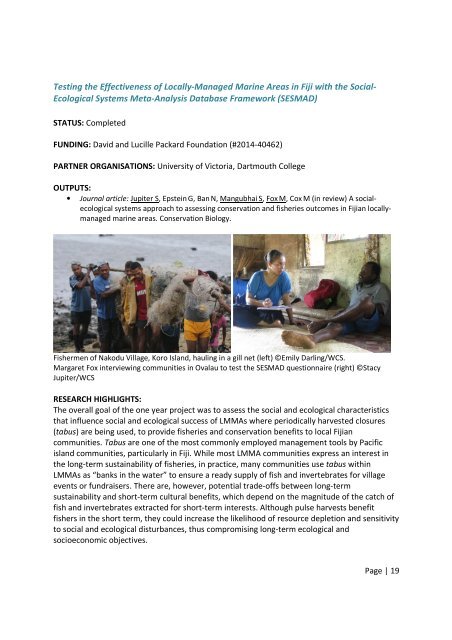FIJI COUNTRY PROGRAM 2015
2015_annual_report_20151214
2015_annual_report_20151214
Create successful ePaper yourself
Turn your PDF publications into a flip-book with our unique Google optimized e-Paper software.
Testing the Effectiveness of Locally-Managed Marine Areas in Fiji with the Social-<br />
Ecological Systems Meta-Analysis Database Framework (SESMAD)<br />
STATUS: Completed<br />
FUNDING: David and Lucille Packard Foundation (#2014-40462)<br />
PARTNER ORGANISATIONS: University of Victoria, Dartmouth College<br />
OUTPUTS:<br />
• Journal article: Jupiter S, Epstein G, Ban N, Mangubhai S, Fox M, Cox M (in review) A socialecological<br />
systems approach to assessing conservation and fisheries outcomes in Fijian locallymanaged<br />
marine areas. Conservation Biology.<br />
Fishermen of Nakodu Village, Koro Island, hauling in a gill net (left) ©Emily Darling/WCS.<br />
Margaret Fox interviewing communities in Ovalau to test the SESMAD questionnaire (right) ©Stacy<br />
Jupiter/WCS<br />
RESEARCH HIGHLIGHTS:<br />
The overall goal of the one year project was to assess the social and ecological characteristics<br />
that influence social and ecological success of LMMAs where periodically harvested closures<br />
(tabus) are being used, to provide fisheries and conservation benefits to local Fijian<br />
communities. Tabus are one of the most commonly employed management tools by Pacific<br />
island communities, particularly in Fiji. While most LMMA communities express an interest in<br />
the long-term sustainability of fisheries, in practice, many communities use tabus within<br />
LMMAs as “banks in the water” to ensure a ready supply of fish and invertebrates for village<br />
events or fundraisers. There are, however, potential trade-offs between long-term<br />
sustainability and short-term cultural benefits, which depend on the magnitude of the catch of<br />
fish and invertebrates extracted for short-term interests. Although pulse harvests benefit<br />
fishers in the short term, they could increase the likelihood of resource depletion and sensitivity<br />
to social and ecological disturbances, thus compromising long-term ecological and<br />
socioeconomic objectives.<br />
Page | 19


